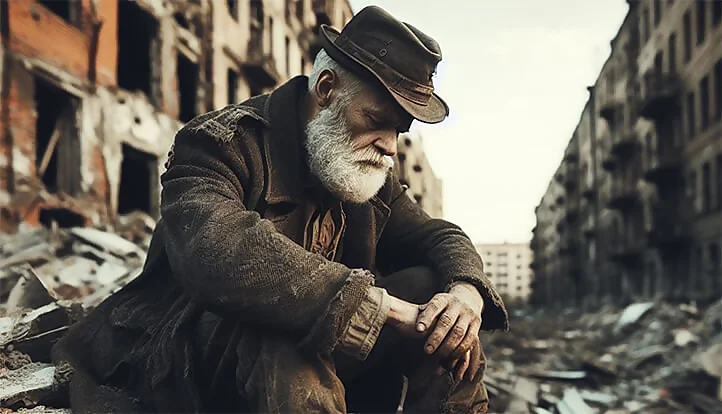In critical moments, when we face traumatic events or life-threatening situations, the survival instinct takes over. However, for some people who have survived a tragedy, the struggle doesn’t end after the danger has passed. They may experience deep feelings of guilt, depression, and emotional difficulties, known as “survivor’s guilt.”
This psychological condition affects people from all walks of life, including military personnel, rescue workers, and victims of natural disasters, terrorist attacks, violence, and catastrophes. Understanding and raising awareness about survivor’s guilt is crucial for providing support and assistance to those struggling with it, as well as preventing its devastating consequences on both individual and societal levels.

What is survivor’s guilt?
Survivor’s guilt is a psychological condition that may develop in individuals who have survived traumatic or life-threatening events, such as natural disasters, plane crashes, military actions, mass shootings, and the like. This condition is characterized by feelings of guilt over having survived while others perished.
The term “survivor’s guilt” was first introduced after World War II to describe the psychological reactions of soldiers who survived the horrors of combat and concentration camps. However, the phenomenon existed long before that. Survivor’s guilt encompasses a range of psychological and emotional reactions experienced by people who have survived traumatic situations where others have died.
The main symptoms include a profound sense of guilt and shame over one’s survival, depression, anxiety, post-traumatic stress disorder (PTSD), chronic stress, sleep disturbances, emotional detachment, anhedonia, and difficulties with social adjustment. People with survivor’s guilt often grapple with haunting questions: “Why did I survive while others didn’t?”, “Do I deserve to live longer than they did?”, “Why did I survive when someone sacrificed their life to save me?”. Such thoughts can lead to deep sadness, self-blame, a sense of life’s meaninglessness, and a loss of purpose.
The prevalence of survivor’s guilt is difficult to estimate, as many people are unaware that their emotional difficulties are related to this condition. Nonetheless, research shows that it can affect a significant portion of those who have survived traumatic events where there was a threat to life. Experts estimate that 10% to 30% of survivors of disasters, terrorist attacks, military actions, and mass violent crimes may experience symptoms of survivor’s guilt to varying degrees of severity.

Key symptoms of survivor’s guilt
While survivor’s guilt often comes with symptoms typical of post-traumatic stress disorder (PTSD), such as recurring nightmares, intrusive memories, hyperreactivity, and avoidance, it has several unique features that distinguish it from PTSD.
One of the key distinguishing characteristics of survivor’s guilt is the sense of guilt and shame over being alive while others died. These emotions can be so overwhelming that survivors begin to question the value of their own life, wondering if they deserve to live at all after what happened.
In addition, people with survivor’s guilt often experience deep sadness and grief not only from the traumatic event but also from the loss of loved ones or colleagues who perished during the tragedy. This pain can be exacerbated by the guilt they feel for surviving when others did not.
Another distinctive feature of survivor’s guilt is the tendency to devalue one’s own life, stripping it of meaning. Survivors may feel that their existence is useless or purposeless after what they have endured and struggle to find motivation to continue their life journey.
Moreover, survivor’s guilt can be accompanied by more pronounced symptoms of clinical depression, social isolation, and breakdown of interpersonal relationships compared to PTSD. This is because individuals with this disorder often feel “different from others” and struggle to establish close connections with those around them, who cannot truly understand their lived experience.
It’s important to note that while survivor’s guilt and PTSD can coexist and share similar symptoms, they require different approaches to therapy and treatment. Therefore, recognizing the unique aspects of survivor’s guilt is critical for providing effective support to those affected.
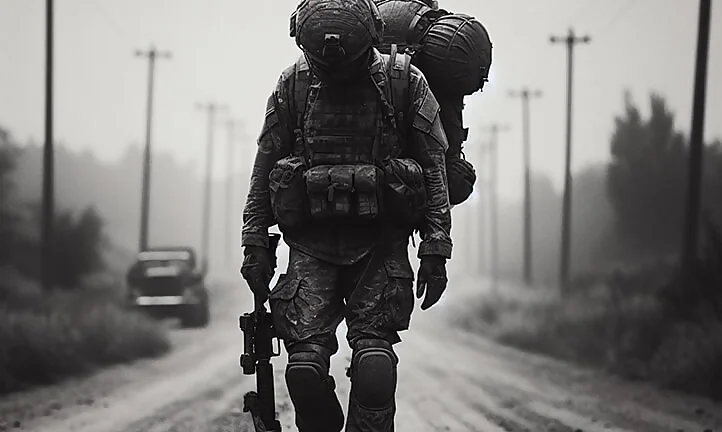
Real-life examples of survivor’s guilt
The stories of people who have faced survivor’s guilt after tragic events are striking in their emotional depth and intensity. One of the most vivid examples is the case of Jeff Bauman, a survivor of the 2013 Boston Marathon bombing. Jeff lost both his legs in the explosion, but his greatest struggle was the profound guilt he felt for surviving while his close friends died.
In interviews, Jeff spoke of his harrowing nightmares, in which he saw his friends die over and over again. He experienced deep depression, apathy, and even suicidal thoughts, grappling with the feeling that he didn’t deserve to live after what had happened. “Why did I survive while they didn’t? What’s so special about me?” he questioned. Jeff’s road to recovery required long-term psychotherapy and immense support from his family and loved ones.
Another poignant example is the story of Maylen Diaz Almaguer, the sole survivor of a plane crash that occurred in Cuba in 2018. The plane Maylen was on crashed shortly after takeoff, claiming the lives of 113 people. Maylen miraculously survived, but she paid a high price: she suffered multiple bone fractures and burns. However, her physical injuries were just the beginning of her ordeal.
Haunted by memories of the crash and the realization that she was the sole survivor among 113 people, Maylen plunged into emotional turmoil. She experienced intense guilt, questioning why she had survived. Her nightmares relived the crash moment over and over.
Despite the support of her family and friends, Maylen had to undergo a long and difficult journey of psychotherapy before she could overcome her guilt and find meaning in continuing her life. Her story vividly illustrates the destructive power of survivor’s guilt and the importance of timely psychological assistance for victims.
The closest example to us is the story of Maksym Melnyk, a Ukrainian tank crewman who survived the explosion of his tank in 2022 but miraculously lived with serious injuries. After this, he was overwhelmed by a deep sense of guilt for surviving while the rest of his crew died.
“I kept asking myself why this happened to me. Why did I survive while they didn’t? I felt immense guilt and shame for not being able to save them,” Maksym recalled in an interview.
Haunted by these thoughts, Maksym fell into a deep depression, refusing to believe he deserved to live after what had happened. He struggled with concentration, suffered from insomnia and nightmares, and lost interest in everything that once brought him joy. Only through intensive therapy and the support of loved ones was Maksym able to gradually overcome survivor’s guilt and find the strength to continue living.
These real-life stories highlight the depth of emotional suffering faced by people who have survived tragic events and the necessity of providing them with timely and qualified psychological assistance.
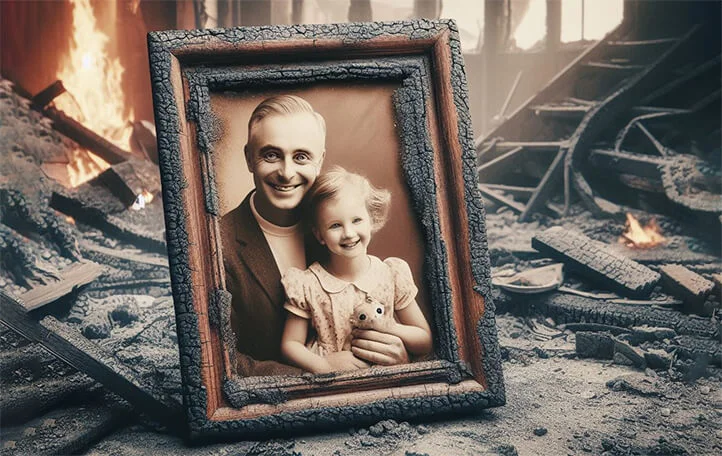
Psychological Aspects
Feelings of guilt and shame for surviving traumatic situations in which others perished are central elements of survivor’s guilt. Individuals may experience profound remorse, asking themselves questions like, “Why me and not them?”, “Did I deserve to live longer than they did?” or “What made me more worthy of life?” These reflections are often accompanied by the painful awareness that someone may have sacrificed their life to save them.
This phenomenon is closely linked to a mechanism known as “displaced survivor’s guilt.” It manifests when people involuntarily blame themselves for the deaths of others in an attempt to make sense of the traumatic and incomprehensible loss. In doing so, they take responsibility for something that was beyond their control. This can intensify the already distressing emotions associated with survival.
One of the key psychological factors contributing to the development of survivor’s guilt is the phenomenon of “irrational optimism.” Many people tend to believe that nothing bad will happen to them, even if they find themselves in a dangerous situation. When they encounter a traumatic event in which others die, it shatters their inner worldview and forces them to question the reasons for their survival.
Feelings of guilt and shame can be exacerbated by the so-called “survivor effect,” where individuals attribute their survival solely to chance or luck rather than their own skills, knowledge, or actions. This can lead to the devaluation of their own life and a sense that it was undeservedly spared.
Furthermore, survivor’s guilt is often accompanied by a phenomenon known as “trauma substitution.” In this case, the person experiences not only their own trauma but also the trauma of those who died or suffered nearby. They “absorb” their pain and suffering, intensifying their own emotional experiences and guilt over their survival.
Another important factor in the development of survivor’s guilt is dissociation – a temporary separation of consciousness from emotions and bodily sensations. During traumatic events, individuals may experience a state of numbness, detachment, or a feeling of “unreality.” This can make it difficult to process traumatic memories later and may lead to a delay or intensification of survivor’s guilt symptoms.
In addition to the aforementioned factors, there are several individual and situational variables that can influence the development and severity of survivor’s guilt. These include a person’s personality traits, prior traumatic experiences, the closeness of their relationship to those who perished, the nature of the traumatic event, the level of social support, and more.
For example, people with certain personality traits, such as high levels of neuroticism, perfectionism, or a tendency towards excessive guilt and self-blame, are more prone to developing survivor’s guilt. Conversely, those with high emotional resilience, optimism, and effective coping strategies for stress may better manage the aftermath of trauma.
The nature of the traumatic event itself can also impact the development of survivor’s guilt. If the event was sudden, unexpected, involved acts of violence or human cruelty, it can intensify psychological trauma and make the healing process more challenging. The level of threat and danger posed to the survivor during the situation also plays a significant role.
The level of social support a person receives after a traumatic event can influence the development of survivor’s guilt. If the survivor feels understood and supported by loved ones, friends, and professionals, the risk of severe symptoms decreases, and they are better able to process the trauma.
Finally, cultural and religious factors also play a role. In some cultures, surviving a tragedy may be viewed as shameful or as a curse, exacerbating the survivor’s guilt and shame. At the same time, some religious beliefs encourage acceptance of survival as part of a divine plan, offering meaning and comfort.

Consequences of Survivor’s Guilt and Its Impact on a Person’s Life
Survivor’s guilt can have a devastating impact on various aspects of a person’s life due to its emotional and psychological weight. On an emotional level, individuals often experience deep depression, chronic anxiety, low self-esteem, despair, apathy, and even suicidal thoughts. Some may turn to harmful coping mechanisms, such as alcohol abuse, drug use, eating disorders, or other forms of self-destruction in an attempt to numb their emotional pain.
In addition, survivor’s guilt can lead to significant problems in interpersonal relationships and social interactions. Survivors often struggle to establish and maintain close connections or trust others, feeling “different.” They may face feelings of social isolation, alienation, and misunderstanding from those around them, who cannot fully grasp the depth of their experiences.
Even within family and friendships, individuals with survivor’s guilt may experience emotional detachment, difficulty expressing feelings, and an inability to enjoy life’s ordinary pleasures due to their overwhelming sense of guilt. Some may choose to withdraw from social contact altogether to avoid painful memories and the need to explain their condition.
Survivor’s guilt can also negatively affect a person’s professional life and career. Survivors often struggle with concentration, motivation, productivity, and overall effectiveness at work. They may feel disconnected from their professional responsibilities, to which they previously dedicated themselves with enthusiasm, or lose interest in their career altogether.
In some cases, survivor’s guilt may lead to emotional burnout, job changes, or even the complete cessation of work, further exacerbating financial problems and psychological distress. Constant stress and tension can also negatively impact physical health, contributing to the development of various psychosomatic disorders.
Sleep disturbances, insomnia, chronic headaches, digestive problems, muscle pain, and weakened immunity often accompany survivor’s guilt, worsening its course. Some individuals may neglect their health and self-care due to emotional exhaustion.
In extreme cases, survivor’s guilt may push a person towards suicidal behavior, especially if they do not receive adequate psychological help and support. Therefore, timely identification and treatment of this condition are crucial to prevent the most severe consequences.
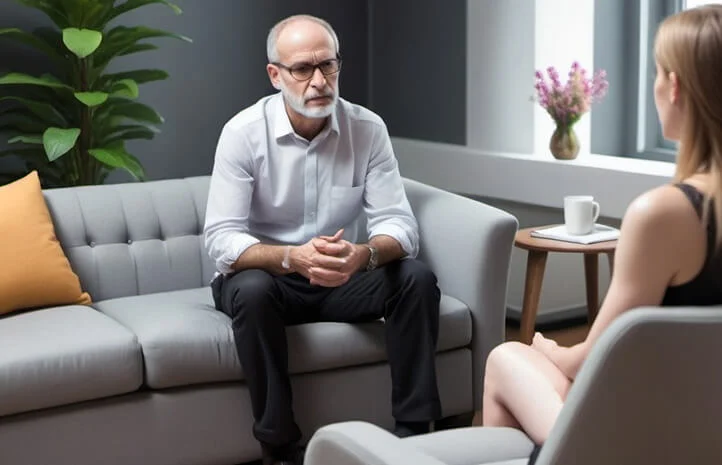
Individual Therapy
For those struggling with survivor’s guilt, various forms of professional help and sources of support are available, which can be extremely beneficial on the road to recovery. Individual psychotherapy, conducted by qualified professionals, plays a key role in overcoming this condition.
One of the most effective types of therapy for dealing with survivor’s guilt is cognitive-behavioral therapy (CBT). Its main goal is to identify and change unhealthy patterns of thinking and behavior that contribute to the development and persistence of symptoms. The therapist helps the patient recognize the irrationality of their guilt, process traumatic experiences in a safe environment, and learn to accept their survival as a given.
In CBT, the technique of cognitive restructuring is widely used. Patients are taught to recognize and challenge negative automatic thoughts (“I don’t deserve to live,” “I’m to blame for their death”), which maintain their painful emotional state. These thoughts are gradually replaced with more realistic and positive beliefs, allowing the individual to come to terms with their survival.
Other useful CBT techniques include exposure exercises, stress management training, relaxation, and mindfulness methods. These help the patient gradually adapt to traumatic memories, overcome anxiety and depressive symptoms, and develop healthier coping strategies.
In addition to CBT, other types of therapy, such as trauma-focused therapy, psychodynamic therapy, and family therapy, are widely used. Trauma-focused methods, such as EMDR (eye movement desensitization and reprocessing), aim to reduce the intensity of PTSD symptoms and facilitate access to suppressed traumatic memories. Psychodynamic therapy helps work through deep emotional conflicts and link current experiences to past ones. Family therapy helps foster understanding and support within the family, which is an important factor in recovery.
Regardless of the specific type of therapy, key elements of working with survivor’s guilt include creating a safe therapeutic space, establishing a trusting relationship between the patient and psychologist, processing traumatic memories and associated emotions, and teaching self-regulation and stress management skills.
It is important to note that therapy is not limited to processing trauma and survivor’s guilt symptoms. It also focuses on restoring the value and meaning of life, finding new goals and perspectives, developing self-acceptance, and strengthening social connections. Only a comprehensive approach, addressing all aspects of this condition, can provide the best results in the healing process.
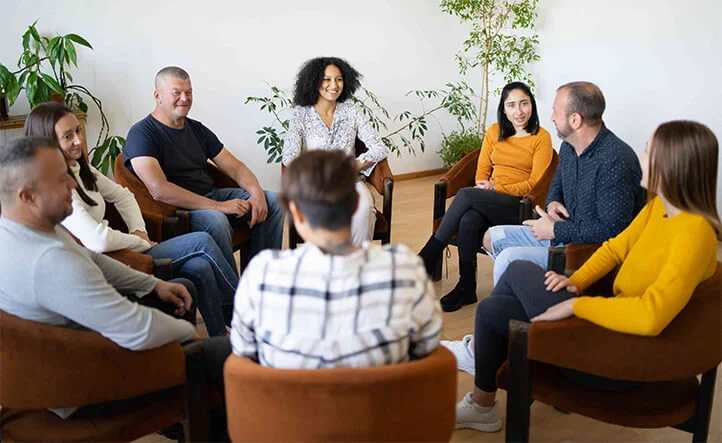
Group Therapy and Interaction
Alongside individual therapy, group work and interaction with people who have faced similar traumatic experiences play a significant role in overcoming survivor guilt. Group psychotherapy offers several advantages in treating this condition:
- First, it provides an atmosphere of mutual understanding, allowing participants to feel that they are not alone in their experiences. People with survivor guilt often suffer from social isolation and a lack of understanding from others, who cannot truly grasp the depth of their emotional pain. Group therapy removes this barrier, creating a safe space where participants can freely share their stories and feelings.
- Second, group dynamics foster a sense of cohesion and support from those with similar experiences. Group members can learn from each other’s examples, exchange effective strategies, and motivate one another on the path to recovery. Knowing that others have overcome similar challenges can instill hope and strengthen one’s belief in their own strength.
- Third, group therapy offers a unique opportunity to develop social skills and restore interpersonal connections that have been disrupted by trauma. People with survivor guilt often struggle with communication and building trust. Group interaction allows them to gradually overcome these barriers in a safe and supportive environment.
In addition to traditional group therapy, support and self-help groups that unite people with similar traumatic experiences play an important role. These groups are usually less structured and provide participants with the opportunity to share their stories, advice, and coping strategies in an informal setting.
Research shows that participation in self-help groups can significantly improve the psychological well-being and quality of life of people suffering from survivor guilt. It helps reduce symptoms of depression, anxiety, and PTSD, and aids in restoring a sense of meaning and purpose in life.
One of the key benefits of such groups is the ability to establish connections with people who genuinely understand the participants’ experiences. This feeling of understanding and acceptance is often the missing link in the support provided by loved ones, despite their best intentions and efforts.
Moreover, self-help groups provide access to valuable resources and information related to survivor guilt, its treatment, and coping strategies. Participants can exchange recommendations on finding qualified professionals, share experiences with different types of therapy, and receive practical advice from those who have already faced similar challenges.
It’s important to note that group work does not replace individual therapy but complements it, providing a more comprehensive approach to overcoming survivor guilt. The combination of professional psychotherapeutic help and support from people with similar experiences can significantly increase the effectiveness of treatment and accelerate the recovery process.

Self-Help and Environment
In addition to professional help and group support, self-help practices and support from one’s close environment play an important role in overcoming survivor guilt.
Self-help involves the active participation of the person in the process of healing and recovery. This can include various techniques and exercises aimed at regulating emotions, developing mindfulness, increasing self-acceptance, and finding meaning in life. Here are the main ones:
- Keeping a journal. Writing down thoughts, feelings, and experiences related to the traumatic event and survivor guilt allows the person to better understand, analyze, and process them. A journal also serves as a tool to track progress in recovery and record achievements along the way.
- Meditation and mindfulness practices help the person learn to stay present in the moment, without dwelling on painful memories or negative thoughts. Mindfulness fosters a more balanced and accepting attitude towards one’s emotions and experiences, which is a vital step in overcoming survivor guilt.
- Creative self-expression, such as drawing, writing, music, or dance, can also be a valuable tool for self-help. It allows for the expression of emotions and experiences in a safe and constructive way, helping to process and release them.
- Physical exercise and an active lifestyle also play a crucial role in the recovery process, helping to reduce stress, improve mood and well-being, and restore a sense of control over one’s body and life.
In addition to self-help practices, the invaluable support of close people—family, friends, and partners—can provide significant help to someone with survivor guilt. Their involvement, empathy, patience, and unconditional acceptance are powerful resources on the path to healing.
However, it’s important that the survivor’s environment is aware of and understands the nature of this condition. Loved ones should avoid judgment, criticism, or attempts to downplay the seriousness of the survivor’s experiences. Instead, they need to create an atmosphere of safety, support, and open dialogue, where the person with survivor guilt can freely express their emotions and feelings.
Moreover, those around the survivor should be patient and recognize that the healing process takes time and effort. They can encourage the survivor in their pursuit of self-help and support them during periods of relapse or symptom flare-ups.
Overall, a comprehensive approach that combines professional psychotherapeutic assistance, group support, self-help practices, and involvement from the close environment provides the best chances of successfully overcoming survivor guilt. Each of these components contributes uniquely to the healing process, helping to restore emotional well-being, strengthen social ties, and find new meaning in life after a traumatic experience.

Raising Awareness: The Role of Professionals and Educational Programs
Raising awareness about survivor guilt is crucial for timely identification and support for those affected, as well as for overcoming the stigma and misunderstanding associated with this condition. Professionals from various fields and educational programs play a key role in this process.
First and foremost, it is necessary to ensure high-quality training for professionals working with people who have experienced traumatic events. These include psychologists, psychotherapists, social workers, healthcare workers, emergency responders, as well as law enforcement and military personnel.
These specialists need to be aware of the symptoms, manifestations, and consequences of survivor guilt to recognize it early and provide the necessary support. Relevant courses and modules should be included in their basic education and professional development programs.
For instance, psychology and social work curricula could integrate courses on trauma psychology, post-traumatic stress disorder, and specific issues like survivor guilt. Students should study the symptoms, psychological mechanisms, consequences, and therapeutic methods for dealing with these conditions.
For practicing professionals, additional training, seminars, and workshops on survivor guilt should be offered. These can be organized by professional associations, research centers, or leading experts in the field. Such events allow professionals to enhance their competence, exchange experiences, and acquire up-to-date knowledge on the latest advancements in diagnosing and treating this condition.
In addition to specialists, raising public awareness about survivor guilt is important. This can be done through various information and education campaigns, media publications, and the creation of educational materials and resources.
For example, brochures, booklets, and informational leaflets explaining the nature of survivor guilt, its symptoms, and consequences can be developed and distributed. These materials should be available in medical institutions, psychological help centers, public organizations, and other venues.
It is also important to create specialized websites and online resources dedicated to survivor guilt, with information about the signs and causes of this condition, recommendations for finding help, lists of qualified professionals and support centers, as well as forums or chats for communication and sharing experiences.
Furthermore, the mass media should be actively involved in covering this topic. Publishing articles, reports, and interviews with experts and people who have experienced survivor guilt can significantly raise public awareness and stimulate social dialogue.
Another effective way to disseminate information is by organizing public lectures, seminars, and conferences where specialists can discuss survivor guilt, its symptoms, and ways to overcome it. Such events can be of interest not only to professionals but also to a broader audience, including students, representatives of public organizations, and concerned citizens.
Finally, topics related to survivor guilt should be included in educational programs for schoolchildren and students. This can promote emotional intelligence and raise awareness of the psychological consequences of traumatic events from an early age.
In general, raising awareness about survivor guilt requires comprehensive efforts from professionals, educational institutions, the media, and public organizations. Only by combining resources and expertise can we overcome the barriers of misunderstanding, stigma, and ignorance surrounding this condition, and provide timely and effective help to those in need.
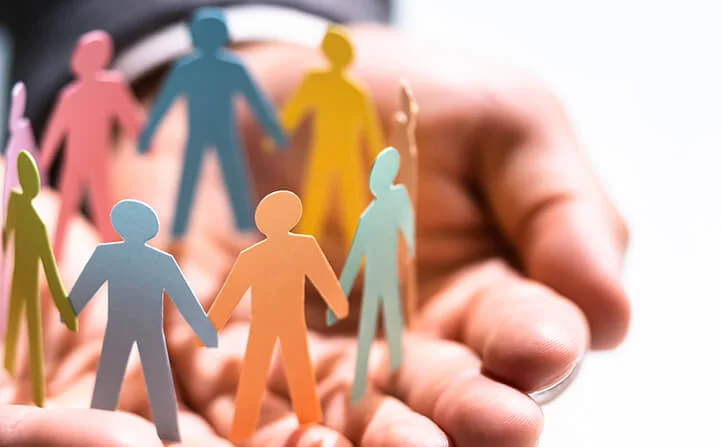
The Role of Public Organizations and Interdisciplinary Collaboration
Non-profit and public organizations, as well as interdisciplinary collaboration between various institutions and agencies, play a crucial role in raising awareness about survivor guilt and providing support to those affected.
Non-profit organizations specializing in psychological trauma, victims of violence, natural disasters, and emergencies can make a significant contribution to spreading information about survivor guilt and offering assistance to those affected.
They can organize informational campaigns, create educational materials and resources, and conduct training and seminars for professionals and the general public. Additionally, these organizations can offer counseling services, group and individual psychotherapy, as well as support programs for people experiencing survivor guilt.
Moreover, non-profit organizations can act as a liaison between various stakeholders, promoting interdisciplinary collaboration and coordination of efforts. They can initiate the creation of working groups, committees, or coalitions that bring together professionals from various fields, such as psychology, medicine, social work, law enforcement, and emergency services.
This collaboration allows for the exchange of experience, expertise, and resources, as well as the development of a comprehensive and coordinated approach to addressing survivor guilt. For instance, law enforcement representatives can provide information about situations where this condition is most likely to develop, while medical professionals can offer insights into the physical and psychosomatic consequences. Psychologists and psychotherapists, in turn, can share their experience in diagnosing and treating survivor guilt.
Additionally, interdisciplinary collaboration allows for more effective allocation of resources and avoids duplication of efforts. Organizations can jointly develop and implement assistance, education, and support programs, drawing on the strengths and expertise of each participant.
Another important aspect of the work of public organizations is advocating for the rights and interests of people with survivor guilt. They can act as advocates, lobbying for the adoption of relevant laws and policies aimed at ensuring access to quality medical and psychological services for the affected, as well as the creation of rehabilitation and social integration programs.
Public organizations can also conduct research and collect data on the prevalence of survivor guilt, its consequences, and the effectiveness of various support methods. This information can be used to raise public awareness, justify the need for additional resources, and develop targeted support programs.
Overall, the involvement of non-profit and public organizations, as well as interdisciplinary collaboration, plays a key role in a comprehensive approach to addressing survivor guilt. By bringing together the efforts of various stakeholders, we can ensure more effective assistance and support for those affected, while also raising awareness and understanding of this condition in society.

Conclusion
Survivor guilt is a serious psychological condition affecting many people who have experienced traumatic events in which others have died. Deep feelings of guilt, depression, anxiety, post-traumatic stress disorder, and emotional detachment are just some of the symptoms survivors face. However, it is important to understand that these emotional reactions are natural and expected in the context of the trauma experienced.
Understanding and awareness of this phenomenon are vital to providing appropriate help and support to those struggling with survivor guilt, as well as preventing its destructive consequences in various aspects of life. Psychotherapy, social support, group interaction, and self-help practices can all help survivors cope with painful emotions, overcome feelings of guilt and shame, restore the value of life, and continue on the path to healing.
Raising public awareness, training specialists, and creating resources to support those affected are critically important steps in recognizing and effectively overcoming survivor guilt at various levels. Only by recognizing the scale of this issue and showing empathy and understanding toward those who have experienced traumatic events can we provide adequate assistance to people bearing the heavy burden of survival.
It is essential to remember that every person dealing with survivor guilt deserves support, compassion, and the opportunity to heal from this painful condition. Many survivors, having done significant inner work, find new meaning in life, greater emotional strength, and a deeper appreciation for each day lived.
By uniting the efforts of professionals, non-profit organizations, and society as a whole, we will help survivors overcome traumatic experiences, cope with emotional barriers, and find hope for a brighter future after the upheavals and tragedies. Each of us can contribute to this important work by showing understanding, offering support, and promoting greater awareness of this issue.
